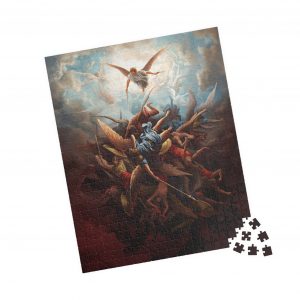



If English is your mother tongue, this is your epic poem.
For centuries, the enduring and indelible imagery of Paradise Lost has shaped our cultural consciousness of the treachery of Satan and the Fall of mankind. The soaring beauty of the language and the depth and complexity of the syntax establish Paradise Lost as an important classic that will be read for centuries to come. Equally important, though less frequently read, Paradise Regained brings the character arcs of both Satan and the Son to a triumphant and deeply satisfying finish. These two great epic poems offer rich insight into the nature of free will, sin, justice, holiness, rebellion, and redemption.
Everyone focuses on Satan. Nobody focuses on Christ.
Paradise Lost and Paradise Regained assert “Eternal Providence” and “justify the ways of God to men” through the magnification of the Son over sin and death. In Paradise Lost, John Milton chronicles the fall of the demon horde into the depths of Hell, the escape of the archfiend into the beauties of unfallen Eden, the deception of Eve and the abdication of Adam, and the promise of future redemption. In the equally important follow-up, Paradise Regained, the great seventeenth-century poet investigates the motivations of Satan as he tempts Jesus in the wilderness, culminating in a second and even greater fall. Throughout both poems, which ought to be read together, the Son is consistently exalted and glorified as the Mighty Victor of Heaven and Earth, the One who will reconcile God to man.
This is His story, and it is glorious.
“Hail, Son of God, Savior of Men! Thy name
Shall be the copious matter of my song”
– Paradise Lost III.412-413

Milton’s Text + Reader’s Guide
Join Joe Carlson, author of the Dante Curriculum, as he walks through each of the epics, offering summaries of the books, notes detailing various classical allusions and Scriptural references, analyses unpacking key moments in the story, and a handful of discussion questions for further contemplation. This guide will greatly enhance the reading of the poems, both for the first-time student and the life-long scholar.



